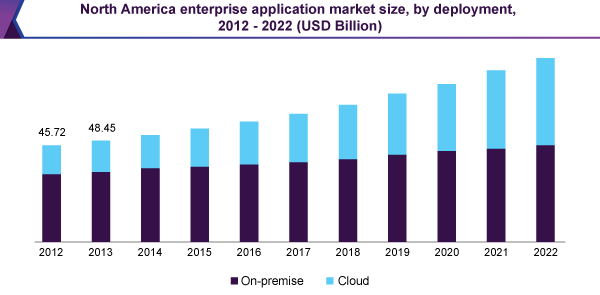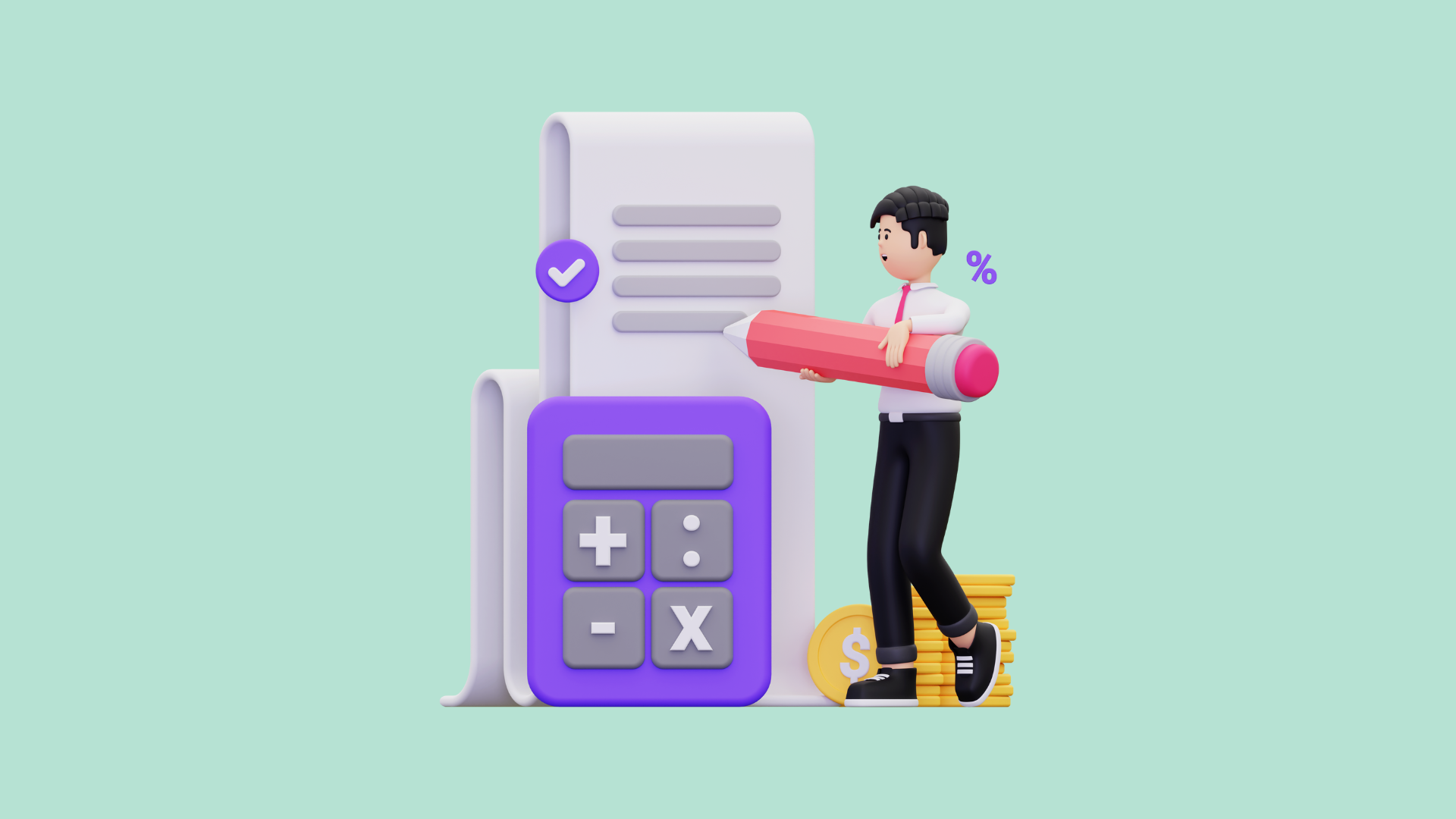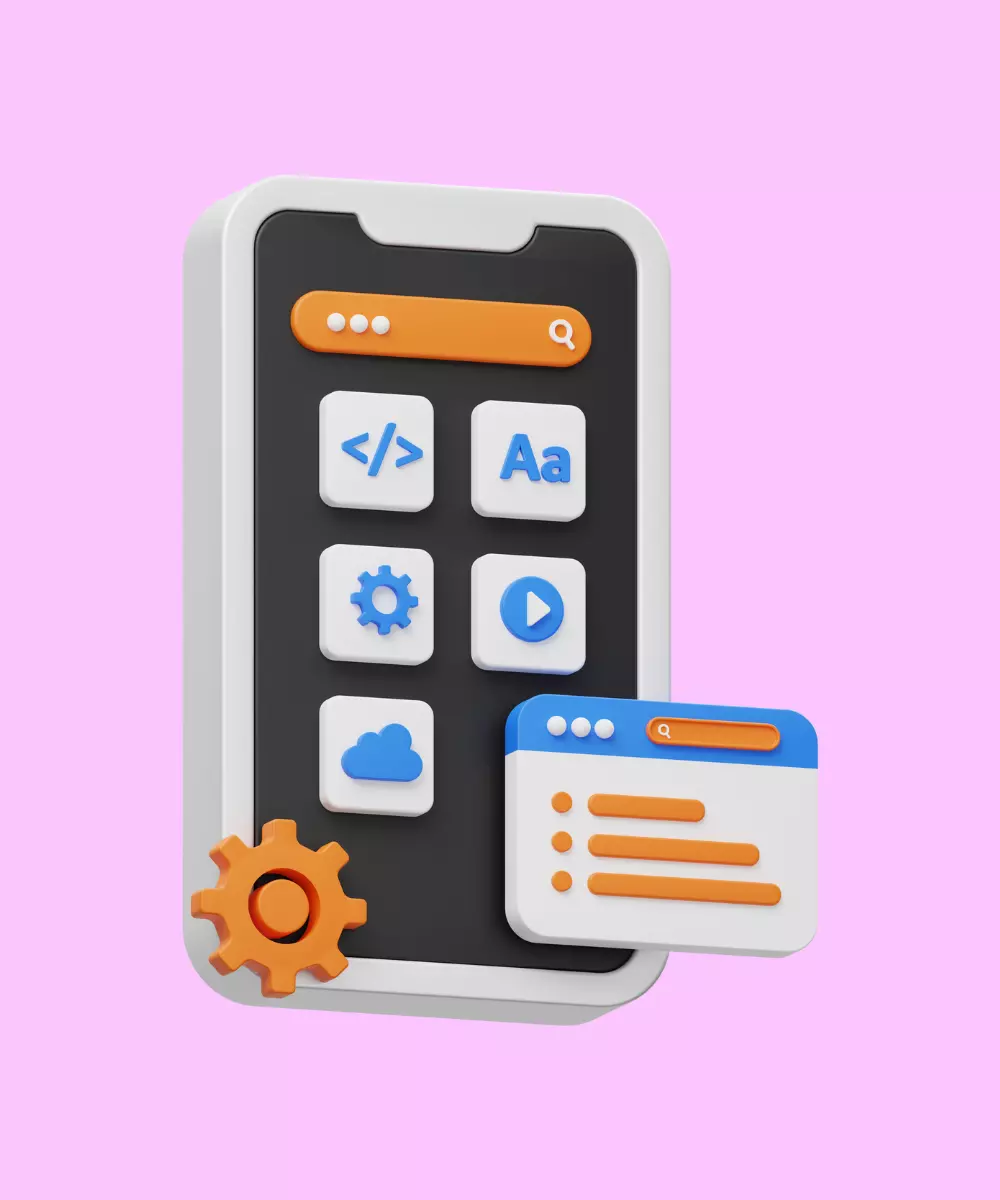The advent of mobile technology has significantly reshaped the business landscape. With enterprise app development taking center stage, organizations are leveraging these tools to streamline operations, foster collaboration, and drive efficiency. Let's delve deep into the world of enterprise mobile apps and unravel their magic.
Enterprise Mobile Apps’ Market: An Overview
The enterprise mobile app market has seen significant growth, transforming business practices by offering improved efficiency, accessibility, and instantaneous collaboration. Looking at its progress:
Grand View Research data indicates the market could grow from $171.66 billion in 2022 to a remarkable $259.51 billion by 2025, underlining increasing business dependence on these applications.

Major influences include digital transformation, which integrates digital tools for optimal accessibility and functioning; the rise of remote work, requiring tools for smooth remote teamwork; and technological innovations in AI, IoT, and cloud computing, enhancing app intelligence and integration. Particularly, the finance, healthcare, and e-commerce sectors are leveraging apps for real-time analytics, patient handling, and sales enhancement. Although North America remains a forerunner in this adoption, the Asia-Pacific region is predicted to witness swift growth due to heightened digitization initiatives.
Looking ahead, we can anticipate a surge in apps incorporating augmented reality and machine learning, with the advent of 5G paving the way for advanced app functionalities. In summary, the enterprise mobile app market's direction points towards a business landscape dominated by digital efficiency and real-time processes.
Understanding Enterprise App Development
What is enterprise app development?
Enterprise app development revolves around creating applications tailored for business challenges. While consumer apps are designed for mass public consumption, enterprise apps hone in on specific organizational goals. These might include bolstering internal communication, enhancing efficiency, or driving data-led decisions. With a core emphasis on solving business-centric issues, these apps play a pivotal role in the evolution of contemporary businesses.
Strategies for enterprise mobile app development
Enterprise businesses often prioritize having their mobile apps accessible on various devices to streamline the development process and cater to market demands. Wondering how to integrate enterprise apps effectively? Here are the top three prevalent strategies for enterprise mobile application development:
- Pre-packaged mobile applications: These are off-the-shelf solutions that enable rapid deployment of enterprise apps within an organization. Though efficient in quick implementation, these apps often have restricted features that might not align with specific organizational needs. Additionally, integrating these applications with intricate and unique enterprise systems can be challenging.
- Integrated app development services: This strategy involves leveraging a standard solution and then tailoring its functionalities to align with the company's unique needs. Engineers have the flexibility to use a range of mobile services across various apps and platforms, ensuring better integration and functionality.
- Custom enterprise app development: Here, businesses build a distinct enterprise app from the ground up, ensuring it aligns perfectly with organizational objectives. Custom app development offers a degree of flexibility in design, features, and application logic, potentially offering a significant competitive edge.
Types of enterprise app software
As businesses vary in size, structure, and need, so do the applications designed for them. Enterprise apps can be segmented based on their operational scope:
- Employee level apps:
Purpose: These cater to individual needs within an organization.
Examples: Time trackers, individual project management tools, personalized HR applications, and intra-department communication tools. - Department level apps:
Purpose: These are sculpted for specific departmental needs, aiming at enhancing functionalities within specialized units.
Examples: Inventory management tools for logistics, payroll processing for HR, or lead tracking systems for sales and marketing teams. - Company level apps:
Purpose: These broad-spectrum solutions encompass the needs of entire organizations, ensuring company-wide integration and cohesion.
Examples: Enterprise Resource Planning (ERP) systems, company-wide Customer Relationship Management (CRM) solutions, and holistic collaboration platforms.
It becomes evident that enterprise app development isn’t just about creating a mobile solution; it’s about building a business-optimized tool. Whether focusing on an individual, a department, or an entire organization, these apps are the bridges that link challenges to solutions in today's corporate landscape.
Benefits of Enterprise Mobile Application Development
Enterprise mobile application development offers businesses a competitive edge by specifically addressing their unique needs. Here are the condensed, standout benefits:
- High level of customization: Enterprise apps are bespoke, crafted to fit a company's specific challenges and objectives. This customization ensures:
- Solutions that target unique business issues.
- Scalability that grows with the business.
- User experiences designed for easy adoption and efficiency.
- Power of one service and customization: Companies often grapple with multiple tools, leading to duplicated features, increased costs, and complex integrations. This not only inflates expenses but also complicates processes, especially in large non-IT enterprises. Instead of multiple tools, imagine a single, customizable app tailored to a business's needs. A good "one service" app should also integrate effortlessly with specialized tools, ensuring no compromise on essential functionalities. In essence, a "one service" approach, combined with seamless integrations, can streamline operations, making them both cost-effective and efficient.
- Boosted efficiency: By automating processes and centralizing data, these apps drastically reduce manual tasks, paving the way for strategic work and increased productivity.
- Instant data access: Real-time data availability accelerates decision-making, keeping businesses agile.
- Seamless collaboration: These apps enhance communication across departments, making collaboration efficient regardless of geographic locations.
- Stronger customer engagement: Enhanced interfaces and real-time support foster deeper customer relationships.
- Superior security: Enterprise applications handle a vast amount of sensitive business data, making security paramount. One of the standout benefits of enterprise applications is their commitment to superior security. For businesses, knowing that their sensitive data is safeguarded means they can focus on core operations without the constant worry of potential breaches. While investing in secure enterprise apps might seem costly upfront, it saves businesses from the potential financial and reputational damages of data breaches in the long run.
- Business Continuity: With advanced encryption, multi-factor authentication, and real-time monitoring, enterprise apps minimize risks of data breaches and disruptions, ensuring smooth business operations.
- Long-term cost efficiency: Despite initial costs, the productivity and efficiency gains make enterprise apps a worthwhile investment in the long run.
In essence, enterprise mobile apps are not just tools; they're strategic assets that amplify business operations in today's digital realm.
Points to Consider Before Enterprise Mobile Application Development
Before diving into the world of enterprise mobile application development, businesses must undertake a thorough analysis. This ensures that the resulting application is aligned with business goals and offers optimal value. Here are some crucial aspects to mull over:
| Points to Consider | Description |
|---|---|
| Clear objectives | Purpose, goals, and metrics to measure the app's success. |
| User perspective | Understand user profiles, user needs, and incorporate feedback mechanisms. |
| Integration with existing systems | Ensure compatibility and data synchronization. |
| Security and compliance | Implement encryption and adhere to regulatory compliance. |
| Scalability | Design for adaptability and flexibility. |
| Budget and ROI | Calculate development costs, maintenance costs, and projected ROI. |
| Choice of platform and technology | Decide on platform and appropriate tech stack. |
| In-house vs. outsourcing | Choose between in-house development or outsourcing. |
Approaching enterprise mobile application development requires a blend of strategy, foresight, and technical insight. By pondering these points, businesses can navigate the development journey more effectively, ensuring the end product resonates with both operational needs and user expectations.
Enterprise Apps Must-Have Features
In the current dynamic business landscape, an enterprise app needs to be equipped with a variety of features to ensure it meets the demands of businesses and end-users. These features not only enhance functionality but also ensure the app remains relevant and effective. Here's a breakdown:
| Enterprise apps features | Description |
|---|---|
| Extensive databases | Comprehensive data storage solutions that cater to large datasets and complex structures. |
| Multiple user roles | Different access levels and permissions depending on the user's role in the organization. |
| Third-party app integrations | Seamless connection and interaction with external applications and services. |
| Real-time analytics | Immediate insights and data visualization to inform business decisions. |
| Instant messaging | Immediate communication tools embedded within the app for enhanced collaboration. |
For an enterprise app to be successful, it must be more than just functional; it should offer a comprehensive set of features that address the dynamic needs of businesses and their users. Investing in these essential features ensures the app remains a valuable tool in a company's tech arsenal.
Tips For Building Enterprise Apps
Building enterprise apps is a demanding task, involving not just technical proficiency, but also a deep understanding of business processes, user needs, and the constantly evolving technology landscape. Here are some essential tips to guide your enterprise app development journey:
Understand the business needs
- Conduct stakeholder interviews: Engage with business heads, team leads, and even end-users to grasp the precise requirements.
- Analyze existing workflows: Study how tasks are currently executed and identify areas for improvement.
Prioritize user experience (UX)
- Interactive design: The design should be intuitive, ensuring users can navigate the app easily.
- Gather feedback: Regularly collect feedback to make necessary adjustments, enhancing the user experience.
Embrace agile development
- Iterative process: Allows for more flexibility, making it easier to incorporate changes based on feedback or changing requirements.
- Regular testing: Ensure each sprint results in a testable product, helping to identify issues early on.
Plan for scalability
- Future-proof architecture: Build with future growth in mind, ensuring the app can handle increased users and data.
- Modular approach: Design the app in modules, so new features can be added without disrupting existing functionality.
Ensure robust security
- Stay updated: Be aware of the latest security threats and implement measures to counteract them.
- Regular security audits: Conduct thorough inspections to identify vulnerabilities and patch them promptly.
Foster collaboration
- Cross-functional teams: Combine talents from various departments like design, development, and business analysis for holistic development.
- Open communication channels: Promote a culture where team members freely share insights, concerns, and feedback.
Continuous testing & QA
- Automated testing: Implement automated tests for key functionalities, ensuring they work as expected.
- Performance testing: Ensure the app performs well under varying loads, especially during peak usage times.

Stay updated with tech trends
- Emerging technologies: Keep an eye out for new technologies that can enhance your app's capabilities.
- Training & workshops: Regularly train your team, ensuring they're up-to-date with the latest development practices.
Creating a successful enterprise app is a blend of understanding business needs, leveraging the right technology, and maintaining a user-centric approach. By following these tips, organizations can navigate the complexities of enterprise app development, delivering solutions that not only meet but exceed user expectations.
Cost to Build An Enterprise App

Understanding the cost to develop an enterprise application is critical for businesses. The expense can vary widely based on multiple factors. Here's a comprehensive breakdown to help you navigate this:
App complexity and features
- Basic apps: These are simple apps with standard features, and their development can cost anywhere from ~$25,000 to $50,000.
- Medium complexity apps: Incorporating more advanced functionalities, the cost can range between ~$50,000 to $150,000.
- High-end, complex apps: These apps have intricate features, integrations, and customizations, pushing the cost upwards of ~$150,000 to $500,000 or more.
Backend infrastructure & integration
- Cloud hosting: Platforms like AWS, Google Cloud or Azure come with varying costs based on storage and operational needs. Compute, Storage, Data Transfer, and Additional Services: ~$20,000 to $100,000/year. This is a broad range since the exact cost will depend on specific services used, traffic levels, data storage needs, and the region.
- Third-party integrations: CRM/ERP Systems Integration: ~$10,000 to $100,000. This depends on the system, the complexity of integration, and any associated licensing fees. Other API Integrations: ~$5,000 to $50,000. This depends on the number and complexity of integrations.
Total estimated cost for a medium-scale enterprise application backend: ~$35,000 to $250,000/year.
Keep in mind this is a ballpark estimate and can vary significantly based on actual requirements, traffic, data needs, and specific integrations. Always consult with a solutions architect or a similar expert to get a precise estimate.

App maintenance & updates
- Regular maintenance: Expect to spend about 15-20% of the initial development cost annually on maintenance, including fixing bugs, updating libraries, and ensuring compatibility with the latest OS versions.
- Feature updates: As your business evolves, so will your app needs. Adding new features can cost anywhere from a few hundred to several thousand dollars, depending on the complexity.
Estimating the cost of enterprise app development is not a straightforward task. It's a blend of the app's complexity, design intricacies, team composition, backend infrastructure, and long-term maintenance. By understanding and considering these factors, businesses can set a realistic budget, ensuring a balance between cost and quality.
Conclusion
In today's digital-forward world, enterprise apps stand as critical assets in enhancing business efficiency and competitiveness. Their potential isn’t just in automation but in unlocking new avenues for growth and collaboration. While the upfront costs may seem substantial, the long-term gains—be it through operational efficiency, data-driven insights, or customer engagement—far outweigh the initial investment.
Navigating the intricate world of app development requires expertise, foresight, and a keen understanding of user needs. As technology continually evolves, so should your strategies and approach.
As we conclude, if you're poised to embark on your enterprise app development voyage, let precision and foresight be your allies. Collaborative efforts, iterative enhancements, and an enduring focus on the end-user are the keystones of app success. And if you're seeking a partner to navigate this journey alongside, What the Flutter is here to translate your vision into a digital masterpiece. Reach out to us, and let's co-create your next success story in the digital domain.
Frequently Asked Questions
- What is enterprise app development?
Enterprise app development refers to the process of creating applications tailored for business needs, enabling organizations to solve unique problems, enhance workflows, and drive efficiency.
- Why are enterprise apps becoming essential for businesses?
Enterprise apps offer businesses a competitive edge by streamlining operations, fostering collaboration, providing real-time analytics, and improving decision-making processes.
- What are the core features to include in an enterprise app?
Key features include extensive databases, multiple user roles, third-party app integrations, real-time analytics, and instant messaging, among others.
- How much does it cost to develop an enterprise app?
The cost varies based on app complexity, design, backend infrastructure, team location, and maintenance. It can range from $25,000 for basic apps to over $500,000 for high-end, intricate applications.
- Are there ongoing costs after app development?
Yes, regular maintenance, updates, and potential expansions can lead to additional costs. Typically, businesses spend about 15-20% of the initial development cost annually on maintenance.












